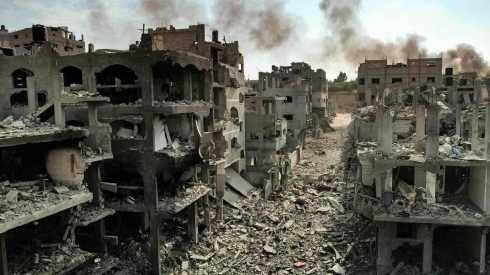When ten years ago I faced the opportunity to join Birzeit University, not everyone encouraged me to join an academic institution.
Skeptics warned that its bureaucracy might limit and challenge my professional growth. But I decided to follow my intuition, shelved these recommendations, and embarked on my adventure. In the beginning, things were not easy and the journey was seldom rosy. I began my Birzeit University career as director of public relations, a position I held for two years before I assumed the responsibility of establishing the university's first resource development office. Our work has been successful and the office has made significant contributions to the support of the university − to the point that in 2015, the Council for Advancement and Support of Education granted us its silver award for an emerging fundraising program.
Questioning, however, the purpose of philanthropy and its role in advancing institutions, I decided to leave my post and continue my learning journey. For two years I studied at the Lilly Family School of Philanthropy at Indiana University in the United States, the world’s first school of philanthropy. Equipped with a Master of Arts in Philanthropic Studies, I have come back loaded with more questions. During my studies, I thought about Palestine and Birzeit University from different angles and in different contexts, considering the different cultures, and creating a program that relates to our context. Linking theory to practice, I realize that both experiences have contributed to the evolvement of my vision for the role of philanthropy in advancing Birzeit University.
During my upcoming term, I aspire to enhance the concept of philanthropy. I envision a shift away from the stereotypical view of giving, moving from charity to social change. The limited perception that views donations as a source of cash, a solution to financial crises, or a means for budget support must be broadened. Gifts and contributions constitute development, democratic participation, the initiation of social change, and the securing of financial stability.
Private philanthropy comprises an arena for participation, a sphere where individuals give money and time. It is not limited to contributions made by the wealthy but a platform where any person can engage. Everyone who is interested in specific social issues can thus take on a humanitarian or patriotic role.
Philanthropy is a source of cash that does not confine an organization to the conditions generally associated with international aid; it provides flexibility yet carries implicit agreements of transparency, accountability, and proper financial management. The risk lies in molding private philanthropy to international aid patterns, the fallacy is to align acts of fundraising with begging. Attracting an individuals’ giving is a noble cause; it provides unique opportunities for people to create meaning in their lives as they contribute to public-spirited and national causes. Our social culture in Palestine and in the Arab world is a culture of giving. We have long adopted the values of interdependence, focusing mainly on close social circles centered on the family. Relief is a fundamental value for private giving in our societies. Today more than ever, we must extend philanthropy to institutions and society at large in our efforts to solve social issues.
Birzeit University is a story of philanthropy. It came to life through the dream and perseverance of a woman who established an inspirational, pioneering model and was supported by a family that wished to contribute to society. The university was developed through the contributions of its community of academics, students, and employees as well as the families of Birzeit city.
Today, as I am starting my journey in attracting private philanthropy to Birzeit University, I continue a legacy that started ninety-five years ago when it was founded as an elementary school for girls in rural Palestine. I am the first female leader in this position and the fourth woman in the institution’s 16-member council. This constitutes a significant achievement for academics and for professional women in Palestine.
Where will we start? We will tackle current needs and seek to alleviate the financial difficulties Birzeit University is facing − much like many other Palestinian institutions and the entire society. Are we chasing the liquidity pressure for the current day, month, and end of the year? Yes. What about the future, where will our university stand ninety-five years from now? We realize that the meaning of “future” has changed in Palestine.
We have become accustomed to our daily struggle against exile, we are trying to adapt to having to fight for our existence on our land. Yet at Birzeit University, we stand on solid ground and can boast with inspiring achievements. The question is, how can we contribute to efforts to maintain the centrality of our University in the vision for the future of Palestinians and our homeland? Our dream is that every Palestinian will have a stake in Birzeit University.
All defenders of justice, freedom, and our right to exist on our land will have a share in our institution; the university will connect us in real and virtual space. Many people around the world cannot reach it today due to the aggressive policies adopted by the occupation forces and the ongoing injustice that is perpetrated against Palestinians. Our dream is that tomorrow, all persons will be able to reach our university. We will work together for Birzeit University, the Palestinian icon of steadfastness on our land and our struggle for freedom.




